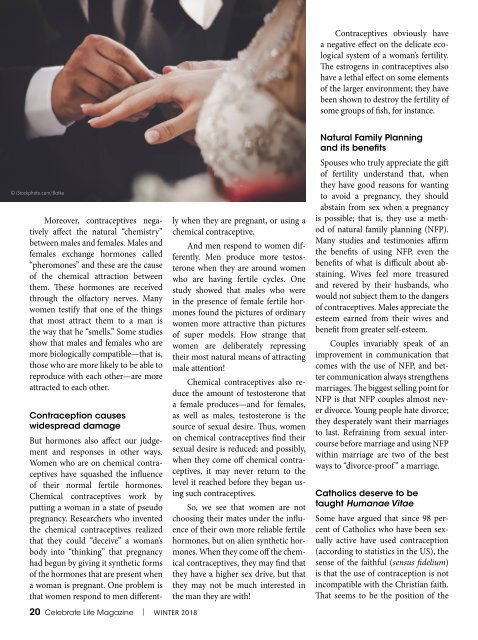Celebrate Life Magazine - Winter 2018
The winter 2018 issue of Celebrate Life Magazine contains "The end of neutrality" by Terrell Clemmons, "Pro-life essay winners," "Humane Vitae's golden anniversary" by Janet E. Smith, PhD, "Priceless value the world does not see" by Lori Hatcher, and "Seven suggestions for recognizing the personhood of the preborn" by Evelyn French
The winter 2018 issue of Celebrate Life Magazine contains "The end of neutrality" by Terrell Clemmons, "Pro-life essay winners," "Humane Vitae's golden anniversary" by Janet E. Smith, PhD, "Priceless value the world does not see" by Lori Hatcher, and "Seven suggestions for recognizing the personhood of the preborn" by Evelyn French
You also want an ePaper? Increase the reach of your titles
YUMPU automatically turns print PDFs into web optimized ePapers that Google loves.
Contraceptives obviously have<br />
a negative effect on the delicate ecological<br />
system of a woman’s fertility.<br />
The estrogens in contraceptives also<br />
have a lethal effect on some elements<br />
of the larger environment; they have<br />
been shown to destroy the fertility of<br />
some groups of fish, for instance.<br />
© iStockphoto.com/Batke<br />
Moreover, contraceptives negatively<br />
affect the natural “chemistry”<br />
between males and females. Males and<br />
females exchange hormones called<br />
“pheromones” and these are the cause<br />
of the chemical attraction between<br />
them. These hormones are received<br />
through the olfactory nerves. Many<br />
women testify that one of the things<br />
that most attract them to a man is<br />
the way that he “smells.” Some studies<br />
show that males and females who are<br />
more biologically compatible—that is,<br />
those who are more likely to be able to<br />
reproduce with each other—are more<br />
attracted to each other.<br />
Contraception causes<br />
widespread damage<br />
But hormones also affect our judgement<br />
and responses in other ways.<br />
Women who are on chemical contraceptives<br />
have squashed the influence<br />
of their normal fertile hormones.<br />
Chemical contraceptives work by<br />
putting a woman in a state of pseudo<br />
pregnancy. Researchers who invented<br />
the chemical contraceptives realized<br />
that they could “deceive” a woman’s<br />
body into “thinking” that pregnancy<br />
had begun by giving it synthetic forms<br />
of the hormones that are present when<br />
a woman is pregnant. One problem is<br />
that women respond to men different-<br />
ly when they are pregnant, or using a<br />
chemical contraceptive.<br />
And men respond to women differently.<br />
Men produce more testosterone<br />
when they are around women<br />
who are having fertile cycles. One<br />
study showed that males who were<br />
in the presence of female fertile hormones<br />
found the pictures of ordinary<br />
women more attractive than pictures<br />
of super models. How strange that<br />
women are deliberately repressing<br />
their most natural means of attracting<br />
male attention!<br />
Chemical contraceptives also reduce<br />
the amount of testosterone that<br />
a female produces—and for females,<br />
as well as males, testosterone is the<br />
source of sexual desire. Thus, women<br />
on chemical contraceptives find their<br />
sexual desire is reduced; and possibly,<br />
when they come off chemical contraceptives,<br />
it may never return to the<br />
level it reached before they began using<br />
such contraceptives.<br />
So, we see that women are not<br />
choosing their mates under the influence<br />
of their own more reliable fertile<br />
hormones, but on alien synthetic hormones.<br />
When they come off the chemical<br />
contraceptives, they may find that<br />
they have a higher sex drive, but that<br />
they may not be much interested in<br />
the man they are with!<br />
Natural Family Planning<br />
and its benefits<br />
Spouses who truly appreciate the gift<br />
of fertility understand that, when<br />
they have good reasons for wanting<br />
to avoid a pregnancy, they should<br />
abstain from sex when a pregnancy<br />
is possible; that is, they use a method<br />
of natural family planning (NFP).<br />
Many studies and testimonies affirm<br />
the benefits of using NFP, even the<br />
benefits of what is difficult about abstaining.<br />
Wives feel more treasured<br />
and revered by their husbands, who<br />
would not subject them to the dangers<br />
of contraceptives. Males appreciate the<br />
esteem earned from their wives and<br />
benefit from greater self-esteem.<br />
Couples invariably speak of an<br />
improvement in communication that<br />
comes with the use of NFP, and better<br />
communication always strengthens<br />
marriages. The biggest selling point for<br />
NFP is that NFP couples almost never<br />
divorce. Young people hate divorce;<br />
they desperately want their marriages<br />
to last. Refraining from sexual intercourse<br />
before marriage and using NFP<br />
within marriage are two of the best<br />
ways to “divorce-proof ” a marriage.<br />
Catholics deserve to be<br />
taught Humanae Vitae<br />
Some have argued that since 98 percent<br />
of Catholics who have been sexually<br />
active have used contraception<br />
(according to statistics in the US), the<br />
sense of the faithful (sensus fidelium)<br />
is that the use of contraception is not<br />
incompatible with the Christian faith.<br />
That seems to be the position of the<br />
20 <strong>Celebrate</strong> <strong>Life</strong> <strong>Magazine</strong> | WINTER <strong>2018</strong>





